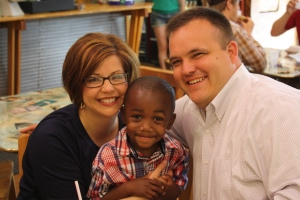 It was a hot June day in 2011. My wife and I had been parents for just four days.
It was a hot June day in 2011. My wife and I had been parents for just four days.
I suppose by this time I had become pretty settled with the idea that America as a whole had shifted away from the “real” experience of racism of a previous generation. Blacks were serving as CEO’s, excelling in higher education, and had even been elected POTUS. Sure. Racism reared its head from time to time in ugly episodes, but I thought that most perceived racism was just leftover from the tensions of another era.
We chose an unusual path to parenthood, in part because we took seriously the call of the Scripture to care for orphans. We became foster parents with the intent of eventually adopting. We had marked on a form that we were open to children of any race, but I don’t think we understood how significant that would be for our lives. So when they called us to receive our first child into our home, our concerns about becoming parents were much greater than our concerns about becoming a bi-racial family. (Rightfully so, parenting still seems more difficult to me than having a bi-racial family.)
Our first weekend together we were on our way to a birthday party and had to stop to get a last minute addition to our gift. We had to stop at a store that was in a town not far from our own. That town had a long and well-known history of racism. So as we got out of the car to walk into the store, I began to run scenarios through my head. What might I do if someone in this store makes a racist remark to this boy that has been given to my care? Should I just ignore it as if the comments don’t matter? Surely I cannot let that be OK for my new son. Should I confront the racist jerk and tell them how ludicrous their comments are? I couldn’t imagine what I might say. Would I just respond with violence and stand up against injustice? That didn’t seem like a Christian response and no one likes to go to jail.
It took a couple days before I realized the significance of that shopping run. For the first time in my life, I had a sense for what it was like everyday for my black friends. They regularly have to make decisions about whether they will defend their honor and stand up to racism or shrink back again from the threat of violence and its consequences.
The instances of violent responses are the only ones that we hear about in the news. But every trip to the store in “that part of town” results in our black friends wondering if today will be the day that they will face a decision about their response. It’s no surprise to me that some people respond with violence when faced with the choice of having their dignity stripped or acting out on their own behalf. That doesn’t excuse violence but it does explain it.
(The best response that I have seen to this article comes from an African woman that recounts her experiences of hatred and fear while regularly running through her white Georgia town. If you want to hear more about how one act of racism creates the fear of another, then her story is a good one.)
It’s true that racism in our country does not mean that people of color won’t be hired for any job. We no longer need bus boycotts and lunch counter sit-ins.
For those of us for whom thinking about race is an optional matter, we have to be very careful about touting the advances in racial matters. Things are better than they were even a generation ago. But the realities are still there. I don’t think we can continue to pretend that racism is only “really” racism when someone is starving, being killed, or being enslaved. My friend, Pastor Jon Robinson, said it like this:
Privilege not only causes white people to miss instances of racism but it causes them to think they get to set the terms or parameters for what constitutes racism as well. For example; situations that can universally be understood as racist like a blatant hate crime, are “in bounds.” But anything that’s not as obvious is dismissed and those who attempt to shed light on less obvious forms of racism get accused of race baiting or, my personal favorite, playing the race card. Which essentially means that if it’s not obviously racist to a white person then it’s not racist.
Race is a complicated matter. The most important thing that I can tell my white friends is that racism is different when you experience it than when you think about it. As long as your reflections upon race and its consequences come from textbooks and muted conversations over coffee, you will not know the realities of racism. Can you imagine walking in fear or anxiety every day of your life? How would it change you? How has it already changed so many young men and women?
Pastor Robinson said that these anxieties aren’t even the worst part of subtle racism. He says, “The frustration and pain of not having my perspective taken seriously or feeling like I have to defend my position all the time, is even more of a problem than living in fear and making the kinds of choices you describe. I spend almost every day feeling like I have to fight to the death to be heard, seen and respected.” I’m not surprised that these are almost the exact same words that I hear from women in the church time and again. We cannot continue to silence these voices.
If these questions cannot be resolved in a heady conversation, then it seems that there is at least one other path: the way of experience. We began to understand racism because we had a chance to experience its possibility along with our son. You too can “experience” racism. If you already have friends of color that will trust you to tell you some of their stories and experiences of racism, then ask them to share. If you don’t, then these Lenten Disciplines are a great way to start decentering your own experience for the sake of another. In the end, nothing will replace an emotional connection with the real suffering of our neighbors of color. You only get that through relationship.
This isn’t the only thing that we learned from raising our son (that we gladly adopted last year). We also have learned that parents that want the most for their children are often faced with a dilemma (even when they have the means to make educational choice) about whether they will give their kids a school environment that is supportive of their identity. Or shall we choose a school where lots of children look like him and he can learn about being black in America? Usually the schools with large African-American populations are struggling and under-resourced. Do I use the means that are within my reach to send him to a school with opportunity that will ensure that he has very few friends that look like him? Is that somehow better? The thing that I’m learning here is that racial minorities have to ask questions that majority populations get the privilege of ignoring. I still don’t know all the questions that I need to be asking.
I think that I can also straightforwardly say that African-Americans treat me differently when they see me with my son. I don’t know how to explain the boundary that exists between many (BUT NOT ALL) black and white persons. But somehow seeing me with my son helps me get past that boundary many times. This makes me think that there may be other ways to overcome this distance. And that may be what is required if white persons in America are to begin to understand racism.
I’ve written a follow up to this very popular post:
You Aren’t Racist, But You Make Racism Possible
For more about the adoption of my son, see: The Most Important Action for Pro-Life Christians: Foster and Adopt
Don’t miss the comment section below. There are some great remarks that give some different perspective. After more than 300 comments, I’ve now closed commenting on this post. While much of the dialogue was constructive, some of the comments near the end were the result of trolling and name-calling. Those have been removed. Those that cannot dialogue civilly have every right under the Constitution to say hateful and uncivil things. But they do not have a right to do so on my blog, which I hope to be a mark of civility.
I recommend Willie Jenning’s recent book The Christian Imagination: Theology and the Origins of Race for an account of how Christians are implicated in racial prejudice and how Christian thought provides a way forward.
Related Posts: Double Standards, Women, and the Church – Part 2
Griselda Was Raped At 13 Years Old & Her Story Is Not Unusual: #LocustEffect

It happens the other way too. I’m white and live in a predominately black part of an American city. Most of my neighbors don’t seem to care or notice that I’m white but I’ve heard a fair amount of heckling/taunting and even was assaulted once just a few blocks from my building walking home (wasn’t robbed or anything, more of a ‘let’s get the white kid’ type of incident). I can’t help but feel less welcome in this community as a result of those experiences, even though I know the perpetrators represent a tiny minority of my neighbors.
Not disagreeing with anything in the post, just pointing out that anyone can be the perpetrator or victim of racism.
I find it so amusing that how many ppl got mad at the first post..Goes to show how far the ignorance goes..It was statement made by a black person talking about other black ppl that are bringing the race down and making black folks look like clowns an many got offended. Well ya know what they say if the shoe fit then wear it!! I agree with every word he said cuz its ALL facts..An he didnt mention the white race because he wasnt talking about them he was speaking on Black Americans..This is the problem ppl dont like to be told the truth ,they like to walk around oblivious to the BS going on.Just look at the ignorance an how proud they are of it by just looking at WorldStar.com…I applause his comment, finally someone said what needed to be said, no instead of feeling in there must be a chance EVERYBODY get ALL defensive. Clean up ur acts and make positive changes!!
I am beginning to volunteer at a children’s group home and ‘half-way’ house. It doesn’t matter to most children what skin color you are, they are happy to see a new face happy to help. These children have been through neglect, abuse, hunger and the last thing they need is discrimination. I don’t think they allow single parent adoptions but if they did, I’d be obliged because I can do all those things parents failed to do (they either did them by choice or force). I would like to know the Rev.’s opinion on a same sex adoption. Would you rather the child be in a loving home with Homosexual parents or with parents that abuse and neglect the child?